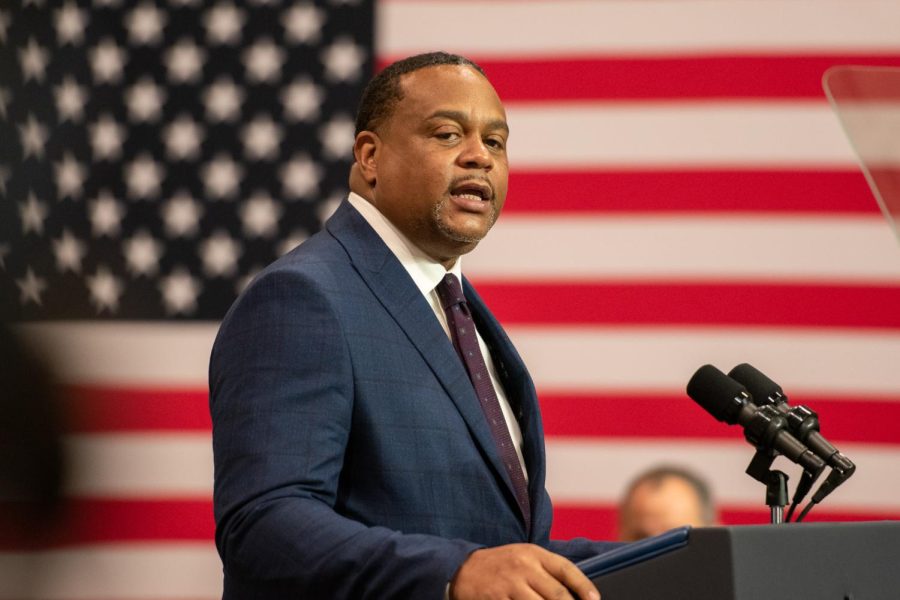City to review Pitt, UPMC property tax exemptions
Mayor Ed Gainey speaks during Joe Biden’s visit to Mill 19 in Pittsburgh on Jan. 28, 2022.
January 25, 2023
Mayor Ed Gainey issued an executive order Tuesday morning calling for an audit of all tax-exempt properties in Pittsburgh.
“In the City of Pittsburgh, 34% of the property is designated as tax-exempt — that is, the owners are not paying any property taxes,” Gainey said in a press release. “The only properties that should not be subject to property taxes are those owned by purely public charities — places where people who are down on their luck get the services they need, mostly for free.”
The review could impact Pitt and UPMC, two of Pittsburgh’s largest nonprofit organizations. In the executive order, Gainey directs the city’s finance and law departments to immediately begin a review of all tax-exempt properties to determine whether they are owned by institutions of purely public charities.
The executive order follows a 2022 report from the offices of the city and county controllers on Pittsburgh’s biggest tax-exempt properties. The report found UPMC “by far benefits the most” from its nonprofit status, reducing its property tax liability by $58.3 million to all local governments and school districts. Pitt reduced its overall property tax liability by $33.1 million.
Maria Montaño, press secretary of the mayor’s office, said Gainey’s executive order “isn’t about any one specific organization” and it is too soon to say whether Pitt or UPMC will be compelled to pay property taxes as a result of the review.
“This is about the fact that right now more than a third of city land is tax exempt — much of that is due to claimed charitable exemptions,” Montaño said. “It is our responsibility to the taxpaying residents of our city to ensure that these organizations meet the requirements as set out in the Pennsylvania Constitution.”
To qualify as purely public charities and maintain their property tax exemption, organizations must meet five criteria set by the Pennsylvania Supreme Court in 1985. They must advance a charitable purpose, donate or render gratuitously a substantial portion of their services, benefit a substantial and indefinite class of persons who are legitimate subjects of charity, relieve the government of some of its burden and operate entirely free from private profit motive.
“If our charities are doing all of these things, then the City of Pittsburgh is benefitting from the presence of the charity and the exemption has been earned,” Montaño said. “If not, then that organization needs to pay its fair share.”
Jared Stonesifer, director of communications at Pitt, said the University is dedicated to working with city government to improve the city.
“The University of Pittsburgh is a significant and steadfast economic engine for the city, as well as a dedicated community leader, anchor and collaborator,” Stonesifer said in a written statement. “We value our longstanding partnerships throughout the city and look forward to continuing to work with the mayor and local officials on building a brighter future for Pittsburgh.”
UPMC released a statement on the executive order, saying it is “proud of our leadership role as a key economic engine for the City, with more than 18,000 employees choosing to work and live within the City itself. The City of Pittsburgh and Mayor Ed Gainey, with whom we have met, are aware of UPMC’s ongoing support and can count on our full participation in programs that are fair and equitable and include the region’s other major nonprofits.”
According to City Solicitor Krysia Kubiak, while the audit will begin right away, it will take a long time to complete due to the number of properties requiring review. Kubiak said the city will start with the largest properties.
“It will take many years to review all of them, but we will do it fairly and equitably so that we are looking at each one in the same light and not playing favorites with them,” said. “We will be starting with the largest properties, just as a way of how we get through this list, but we will also be starting with what the residents tell us.”
Kubiak declined to name which large properties the city would review first.
Once the city finds an organization should no longer have tax-exempt status, it will notify the county and the property owner has a right to object before any payment is due, Kubiak said. The audit will not include religious institutions, and it will not impact any nonprofit organization’s federal income tax exemption status.
Gainey asked any resident with information that a nonprofit may not be acting as an institution of purely public charity to notify the finance and law departments at [email protected].
“We are asking our residents to help us in this endeavor,” Gainey said in a press release. “You are in the neighborhoods and you know what is really going on in your communities. If you think that a charity is getting out from paying taxes when they don’t deserve it, please let us know.”








